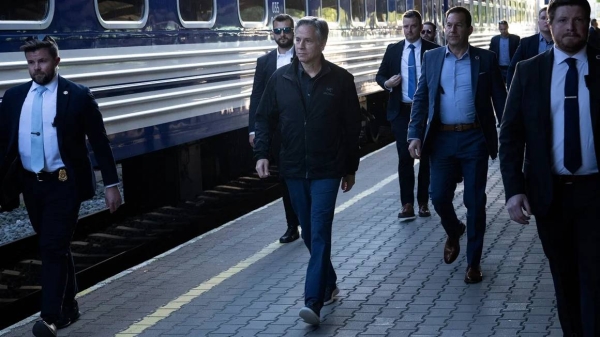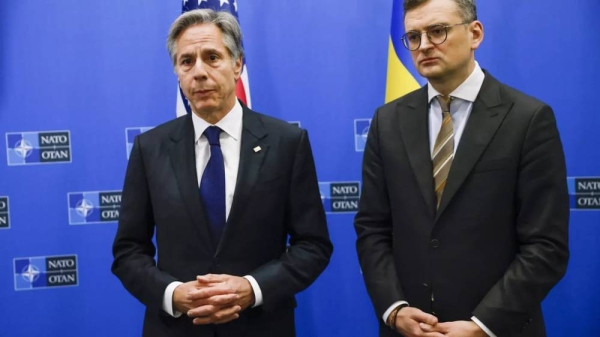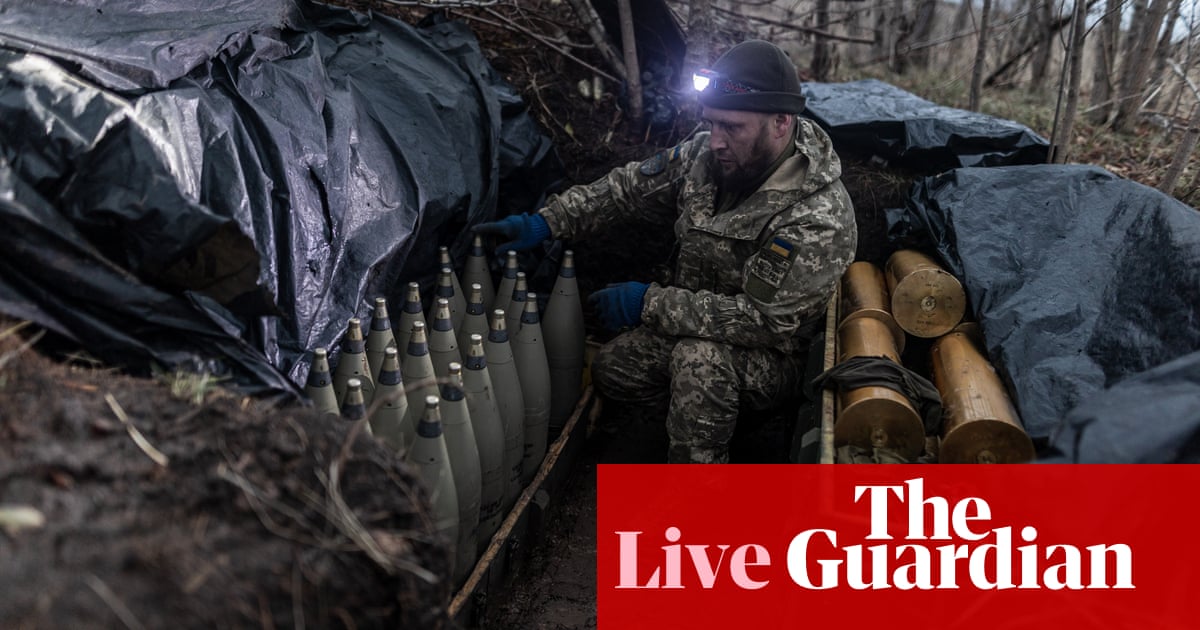
US defence secretary: Russia "poised to strike" Ukraine
The US defence secretary Lloyd Austin on Saturday appeared to compare Russia’s military to a snake that was uncoiling and preparing to strike Ukraine, after a massive military buildup that has stoked the biggest east-west crisis since the cold war.
Austin, speaking on a trip to Lithuania, said he agreed with president Joe Biden’s Friday assessment that Russian president Vladimir Putin has made a decision to stage a new invasion of Ukraine.
“They are uncoiling and are now poised to strike,” Austin told a news conference in the Lithuanian capital, Vilnius, ahead of talks with increasingly anxious Baltic leaders.
Shaun Walker files this moving report from Stanytsia Luhanska, once a suburb of the city Luhansk, but since the war, has been separated from it by a frontline.
Raisa Malashenko was trundling her rusty bicycle, laden with bags of food, through the centre of Stanytsia Luhanska on Saturday afternoon. The 81-year-old did not flinch as booms of artillery sounded in the distance.
Her five children have all left this frontline town, some for Russia and others for safer parts of Ukraine. “It’s just me and my cow now,” she said mournfully.
Like many older people in eastern Ukraine, Malashenko said she missed the Soviet period, and said she blamed the Ukrainian army and Kyiv’s western backers for the current escalation. But she also said she was terrified of a Russian invasion.
“God forbid the Russians come, and then with them their Cossacks and Chechen fighters will come. Imagine what a hell it will be then,” she said, a tear glistening in one of her eyes.
Walker was among a group of journalists who joined the Ukrainian military on a visit to the town. Their goal was to help dispel what Ukraine has said is a false Russian narrative that the Ukrainian army has been behind the recent uptick in violence.
There they observed rubble still scattered on the floor of the Fairy Tale kindergarten, which was hit by fire on Thursday, injuring two people.
Multiple explosions could be heard overnight in the centre of the separatist-controlled city of Donetsk in eastern Ukraine, according to a Reuters journalist in the area.
The origin of the explosions was not clear, the agency said. There was no immediate comment from separatist authorities or from Kyiv.
Ukraine’s interior minister was forced to dive for cover during a visit to the frontline of the eight-year conflict with pro-Russian separatists on Saturday.
Reporters accompanying the minister, Denys Monastyrsky, said the area came under “surprise mortar barrage” during the visit to meet with troops and inspect the trenches near Novoluganske, in the Donetsk region of eastern Ukraine.
According to AFP, Monastyrsky, his entourage and reporters scrambled for cover as several mortar shells landed in nearby fields. No one was hurt and Monastyrsky later said he did not believe he had been targeted.
The tour was intended to underscore for journalists the escalating danger along the frontline. Their experience left little doubt.
Ukrainian president Volodymyr Zelenskiy said on Saturday he had an “urgent” phone call with French president Emmanuel Macron to discuss the potential for immediate “de-escalation & political diplomatic settlement” in eastern Ukraine.
International observers and the Ukrainian government have reported a sharp rise in ceasefire violations by Russia-backed separatists as the US and UK warn that a Russian invasion of Ukraine could be imminent.
In a tweet, Zelenskiy said he informed Macron of the “aggravation on the frontline, our losses, the shelling.”
G7 foreign ministers: ‘We will judge Russia by its deeds’
The G7 foreign ministers on Saturday said they remain “gravely concerned” about the build up of Russian forces along its border with Ukraine.
The statement, signed by the foreign ministers of Canada, France, Germany, Italy, Japan, the UK, the US and the High Representative of the EU, urged diplomacy and de-escalation, but warned: “We will judge Russia by its deeds.”
“Russia’s unprovoked and unjustified massing of military forces, the largest deployment on the European continent since the end of the Cold War is a challenge to global security and the international order,” the statement said.
It continued: “While we are ready to explore diplomatic solutions to address legitimate security concerns, Russia should be in no doubt that any further military aggression against Ukraine will have massive consequences, including financial and economic sanctions on a wide array of sectoral and individual targets that would impose severe and unprecedented costs on the Russian economy.”
Observers from the Organisation for Security and Cooperation in Europe (OSCE) on Saturday reported more than 1,500 ceasefire violations in east Ukraine in a single day, the highest number recorded this year.
The report covered attacks on Friday, in which monitors registered 975 breaches in Luhansk and 591 in neighbouring Donetsk, two regions partly controlled by the pro-Russian separatists. The observers also said it had logged 860 explosions in Luhansk and 553 in Donetsk.
The OSCE confirmed one civilian was injured in the government-controlled area of Donetsk.
The eight-year conflict has seen a sharp uptick in violence over the last week, as the west fears Russia is creating false pretexts for an attack on Ukraine while amassing troops on the Ukrainian border.
The Ukrainian military said on Saturday two soldiers were killed and four wounded in shelling by pro-Russian separatists, while Russia opened a criminal investigation into reports that Ukrainian shells exploded in Russia’s border region of Rostov, charges Kyiv has flatly denied.
During a frenetic day of speech-making and behind-the-scenes negotiating in Munich, US secretary of state Antony Blinken sat for an interview with Dozhd TV, an independent Russian TV channel, to denounce the Kremlin’s claims that it is Ukraine, not Russia, acting as the aggressor.
“Unfortunately what we’re seeing is playing out exactly as I said a few days ago at the United Nations security council,” Blinken told Ekaterina Kotrikadze of Dozhd TV. “There is the fabrication of provocations that would be then used as a justification for Russian military intervention in the Donbas and in Ukraine more broadly.”
Blinken called claims by Moscow of a “genocide” in Donbas “absolutely wrong and frankly offensive”. He said Ukraine had eight years to try to recapture Donbas and said it “defies any logic” to accuse it of trying to do that now with 150,000 Russian troops massed at the border.
Blinken said he is still prepared to meet his Russian counterpart, foreign minister, Sergei Lavrov, next week in Europe, assuming that “Russia does not invade Ukraine in the meantime”.
Asked if there was anything the US could offer that would de-escalate tensions, Blinken said there were many areas where the two world powers could work together to “improve everyone’s security”.
“But doing that as well with a gun pointed to Ukraine’s head – 150,000 Russian forces to the north, to the east, to the south – it’s very difficult to make progress in that environment,” he said.
Questioning the quality of information Putin was receiving, Blinken said public sentiment in Ukraine had shifted sharply away from Russia since it invaded Crimea in 2014. “If [Putin] believes that Russian forces would be accepted with open arms in Ukraine, I think he’s profoundly wrong,” Blinken said.
Citing “concerns and confusion” within Russia about the US’s recent assessments, Kotrikadze, asked Blinken to describe the “level” of intelligence the country receives. “All I can tell you is this,” he replied. “We’re very confident in the information that we have.”
Ukrainian defence minister Oleksii Reznikov on Saturday thanked Canada’s military for sending rifles, machine guns and surveillance equipment.
“Thank you for this important & timely decision,” Reznikov wrote on Twitter.
Moscow correspondent Andrew Roth is on the ground near the Russian border with Ukraine, where tents have been set up to house evacuees from the Donbas.
Reuters: Nato relocates Ukraine staff from capital for safety reasons
Nato is relocating staff based in Ukraine’s capital, Kyiv, to Lviv in the west of the country and to Brussels for safety reasons, according to Reuters, citing a Nato official. The decision was first reported by Norwegian daily VG.
“The safety of our personnel is paramount, so staff have been relocated to Lviv and Brussels. The Nato offices in Ukraine remain operational,” the official to Reuters, without providing an estimate of the people and positions that had been moved.
This follows decisions by the US and the UK to relocate their Ukraine embassy operations from Kyiv to Lviv. Several other nations have moved diplomats and services out of the capital as well.
The World Bank Group is prepared to quickly disburse up to $350m to Ukraine, action that will be considered by the group’s board before the end of March, according to a statement from the organisation on Saturday.
According to a readout of a meeting between the World Bank president, David Malpass, and the Ukrainian president, Volodymyr Zelenskiy, Malpass said the group will continue to support the Ukrainian people and economy for its “short and long-term financing needs”.
The statement said the $350m disbursement “would be followed by further budget support and additional reforms, including in the energy and climate areas.”
Malpass and Zelenskiy also discussed the World Bank’s “robust pipeline of planned projects for Ukraine, including energy efficiency, infrastructure, railways, and strengthening the economy and job opportunities in eastern Ukraine,” it said.
Annalena Baerbock, the German foreign minister, warned that it remained unclear whether Vladimir Putin had yet made a decision about Ukraine, tamping down Washington’s urgent warnings of an imminent invasion.
“We do not know yet if an attack has been decided on,” she told reporters on the sidelines of the Munich Security Conference, according to AFP. She added that the “threat against Ukraine is very real”.
On Friday, Joe Biden said he was “convinced” that Putin had “made the decision” to attack Ukraine.
Pressed on whether Germany shared the US assessment, Baerbock replied: “In crisis situations, the most inappropriate thing to do is to somehow guess or assume.”
“My urgent appeal to all is that we look closely at the facts on the ground,” she continued, warning against the risk of “targeted disinformation”.
According to the news agency, Baerbock made her remarks after hosting a G7 foreign ministers’ meeting, which has been dominated by the Ukraine crisis this year. She said the nations were “united” and prepared to respond in the event Russia invades Ukraine.
To Putin, she said: “Pull your troops back, avoid damage to Russia and Ukraine and let us talk.”
China has seized on the crisis in Ukraine to criticise Nato, which last year branded Beijing as a “systemic challenge”.
Speaking at the Munich Security Conference on Saturday, Chinese foreign minister Wang Yi said of Nato’s expansion: “If Nato keeps expanding eastward, is it conducive to maintaining peace and stability in Europe?”
He also called on Nato to “adapt”. “Since the cold war is long gone, Nato, a product of the cold war, needs to adapt itself to the changing circumstances,” he said.
At the same time, Wang said “all countries’ sovereignty, independence and territorial integrity should be respected and safeguarded”, and that “Ukraine is no exception to the principle”. He also urged a return to the Minsk II agreement “as quickly as possible”.
Wang’s comment did not go down well with Nato.
“[F]or the first time, we now see Beijing joining Moscow in calling on Nato to stop admitting new members,” said Nato’s secretary general Jens Stoltenberg. “It is an attempt to control the fate of free nations. To rewrite the international rulebook. And impose their own authoritarian models of governance.”
But perhaps there’s another reason why Beijing is keen to talk about Nato, analysts say.
Last year, Nato leaders declared China presents a security risk at their annual summit in Brussels. It was the first time the traditionally Russia-focused military alliance had asserted the need to respond to Beijing’s growing prowess. Beijing was furious.
Read Vincent’s analysis for a deeper look at the complicated relationship between China and Nato.
Amid the grim assessments and growing fears of an imminent Russian invasion that have consumed the security conference in Munich, the Ukrainian president offered an unexpected moment of levity.
Tapping his headset, Volodymyr Zelenskiy joked that it might have been hacked by Russia.
“I think, cyberattack,” he said with a wry smile, before explaining that the translation had stopped working.
As he waited for a replacement, he deadpanned: “See, Russia’s not here, but they’re here.”
The audience roared with laughter.
Speaking on a panel at the security conference in Munich, Truss also warned that the “global security architecture that we have at the moment isn’t sufficient to deal with the new challenges we face”.
She said there must be more advancements in the areas of space and new technology, such as hypersonic weapons. Looking ahead, she said it was imperative to make the current system of collective security more global.
“Any future arms control needs to also include China,” Truss said. “We can’t be in a situation where only one part of the world that is constrained and the rest isn’t.”
“Euro-Atlantic security is not divisible from Indo-Pacific security,” she added, pointing to the joint statement from Putin and Xi.
The Ukrainian President Volodymyr Zelenskiy challenged the west to explain why it had not done more to protect Ukraine, not just now that the country was under the threat of invasion by Russia, but during the onslaught over the past eight years. Describing the policy as one of appeasement, he called for world leaders to meet to create a new security architecture.
He also called for Nato to give an indication of how long it would take for Ukraine to be given membership, and in the meantime for the country to be given security guarantees.
Flying to Munich from Kyiv with America warning a Russian attack on his capital was imminent, Zelenskiy said he had left his country in good hands with its soldiers and people. “I had my breakfast in Ukraine and I will have my dinner in Ukraine,” he reassured the audience.
He used much of his 20-minute address to challenge the west about what had happened to its promise of Nato membership, and asked what message the west had for the two soldiers killed on the frontline on Saturday.
He said he did not know what Vladimir Putin wanted, which was why he proposed a meeting, saying he was willing to discuss the Minsk agreements with him.
“We do not need your sanctions after our country has been bombarded and we have lost our borders.”
He added that if Russia pulled back its troops there would be no sanctions, but then said he feared “if the west cannot even disclose what will happen to whom when the war starts then I doubt it will be triggered at all after it happens”.
He insisted his army was keeping calm, resilient and adult in the face of cynical Russian attacks on the territory it controls, he nevertheless acknowledged that the risks were high and one provocative shell fire could yet spark war. He said his country could not secure stability if there were constant predictions of war the next day.
“Ukraine is longing for peace. Europe is longing for peace. The world is saying it does not want any war and Russia is claiming it does want to intervene. Someone here is lying.”
He said: “We are told that the doors of Nato are open but for the moment we are told that it is not possible. Are these doors really open? You have an open door but strangers do not seem to be allowed.
“Open doors are good, but we need answers,” he said. “If you don’t want to see us there, be honest about it. All these questions require answers.”
Recalling the recent attacks on a kindergarten in eastern Ukraine, he said the “kids were not turning to Nato, they were going to their classrooms”.
He opened by asking: “Has our world completely forgotten the mistakes of the 20th century and where does the appeasement policy usually lead to? These are horrific history lessons. How did we get to this point in the 21st century where the war is being waged and where people are dying how did we end up in the biggest security crisis since the end of the cold war?”
He added: “The security architecture of our world is brittle, obsolete and the rules that were agreed dozens of years ago are no longer working. The security system is slow and failing us time and time again.”
He blamed “egotism, arrogance and irresponsibility at the global level. Some countries resort to crime and others resort to indifference”.
“It is too late to fix the current architecture. It is high time for a new one before we pay with millions of casualties.”
He vowed his country would support itself with or without the help of its partners.












